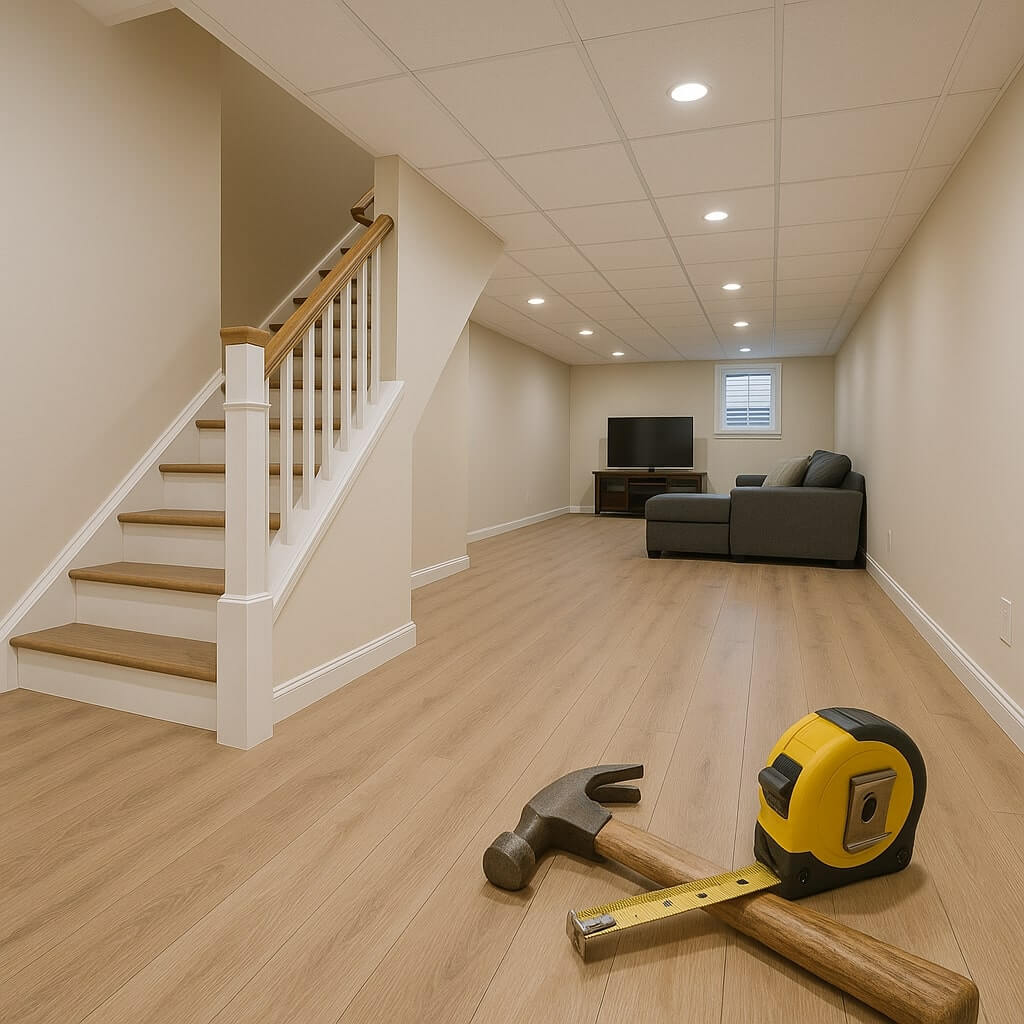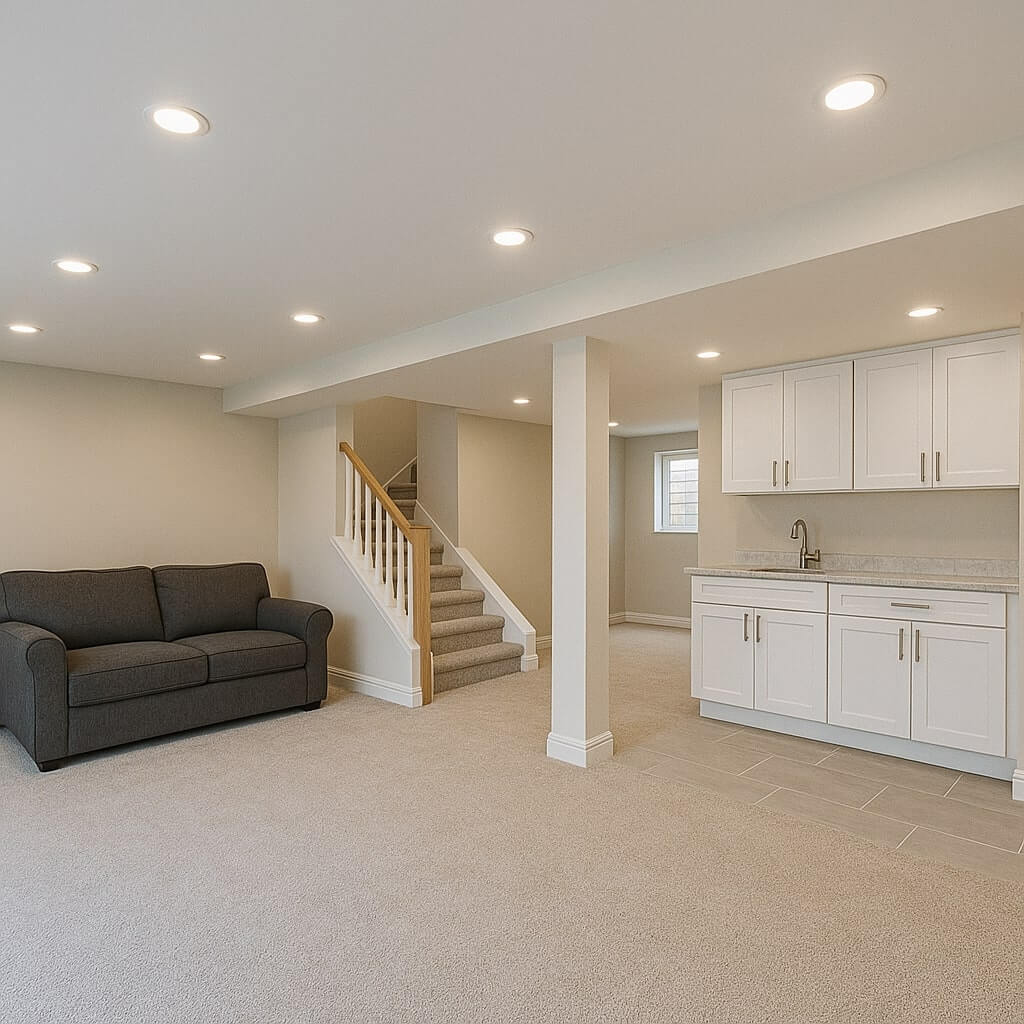If you’re considering a basement remodel in Philadelphia, you’ve got a unique opportunity to enhance your home’s functionality and value. Start by evaluating your space and defining clear goals for the project. But before diving in, it’s essential to navigate local building codes and regulations that could impact your plans. Understanding these elements will set the foundation for a successful remodel. Let’s explore the key tips you need to guarantee your project meets both your needs and local standards.
Key Takeaways
- Assess your basement’s dimensions and structural elements to ensure efficient design and maximize functionality.
- Verify local building codes and obtain necessary permits to comply with regulations and avoid delays.
- Prioritize waterproofing and moisture control with barriers, high-quality materials, and proper drainage solutions.
- Incorporate adequate lighting and ventilation through recessed lighting, windows, and ceiling fans for a comfortable atmosphere.
- Design the space for flexibility with multi-purpose use and modular furniture to adapt to future needs.
Assess Your Space and Define Your Goals

How can you make the most of your basement remodel? Start by evaluating your current space. Measure dimensions, noting any structural elements like beams or ducts that could impact your design.
Think about how you want to utilize the space—perhaps as a cozy family room, a home office, or a guest suite. Defining your goals early helps guide your choices.
Consider design aesthetics that align with your home’s overall look, ensuring a cohesive feel. Prioritize functionality while maximizing space utilization, allowing for efficient movement and storage.
With clear objectives, your remodel won’t only enhance your home but also your lifestyle.
Understand Local Building Codes and Regulations
Once you’ve outlined your goals for the basement remodel, it’s important to familiarize yourself with local building codes and regulations. Understanding these rules guarantees your project runs smoothly and meets safety standards.
Familiarizing yourself with local building codes ensures a smooth and safe basement remodel.
Here are some key points to reflect on:
- Obtain necessary building permits before starting any major work.
- Review zoning laws to guarantee your plans comply with local guidelines.
- Check inspection requirements to avoid costly delays later.
- Consult with professionals familiar with Philadelphia regulations for expert advice.
Prioritize Waterproofing and Moisture Control

Since a basement’s proximity to the ground makes it particularly vulnerable to moisture, prioritizing waterproofing and moisture control is crucial for a successful remodel.
Start by installing moisture barriers on walls and floors to prevent water infiltration. Consider using high-quality materials that will withstand damp conditions.
Additionally, implement drainage solutions such as sump pumps and French drains to manage excess water effectively. Regularly inspect these systems to verify they function properly.
Plan for Adequate Lighting and Ventilation
After addressing moisture control, the next step is to guarantee your basement has adequate lighting and ventilation.
Proper lighting options and ventilation solutions can transform your space. Here are four essential tips:
Transform your space with effective lighting and ventilation solutions for a brighter, more inviting basement.
- Install recessed lighting to create an even glow without taking up space.
- Add large windows or egress windows to allow natural light and fresh air.
- Use LED fixtures for energy efficiency and longevity.
- Incorporate ceiling fans to improve airflow and keep the area comfortable.
Consider Future Needs and Flexibility

When planning your basement remodel, it’s crucial to think about future needs and flexibility, as these considerations can considerably enhance the space’s functionality.
Consider incorporating a multi-purpose design that allows for easy transformation between uses, like a guest room, home office, or play area. This approach guarantees future adaptability, accommodating changes in your lifestyle or family dynamics.
Install modular furniture and partitions to maximize versatility. Additionally, plan for adequate electrical outlets and storage solutions, so your basement remains practical over time.
Conclusion
Remodeling your basement in Philadelphia can transform an underutilized space into a valuable part of your home. By evaluating your needs, adhering to local regulations, prioritizing waterproofing, ensuring proper lighting and ventilation, and planning for flexibility, you’ll create a functional, inviting atmosphere. Taking these essential steps not only enhances your home’s aesthetic appeal but also boosts its overall value. So, plunge in with confidence and make the most of your basement remodel!




